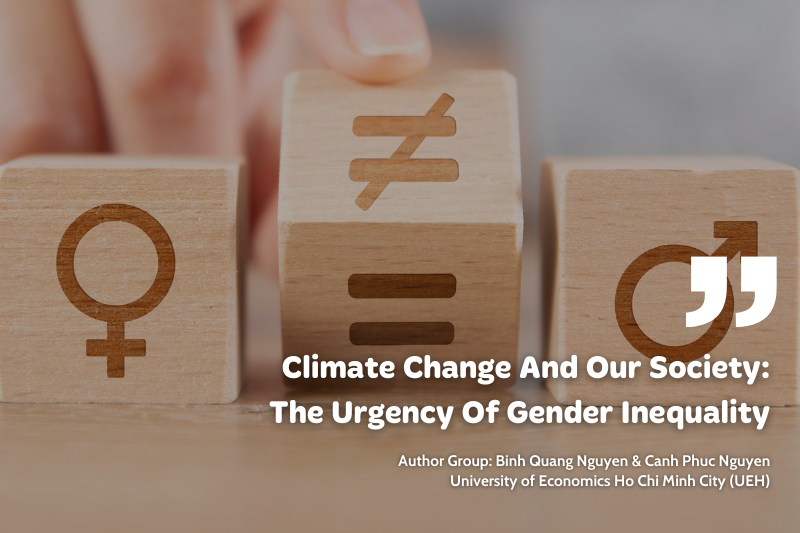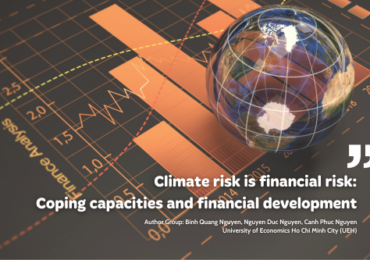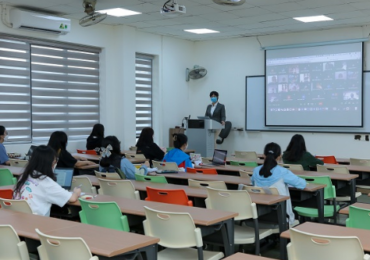Climate Change And Our Society: The Urgency Of Gender Inequality
12 October, 2023
On 9 Oct 2023, the Royal Swedish Academy of Sciences has decided to award the Sveriges Riksbank Prize (i.e. Nobel Prize) in Economic Sciences in 2023 to Professor Claudia Goldin at Harvard University, USA. Professor Goldin has uncovered key drivers of gender differences in the labour market. This award reminds us about a serious social issue: gender inequality. Meanwhile, climate change and global warming are major challenges worldwide, which causing several consequences on the economy and society. This article raises a concern that natural threats might influence gender inequality significantly through empirical evidence from our recent study. Therefore, we call for more efforts and attention from both governments and scholars in the backdrop of climate change and global warming.

Gender equality is emphasized as an important goal (No. 5) in the United Nations Sustainable Development Goals (UN 2020). According to the United Nations (UN), our World seems to derail from the track to achieve gender equality by 2030. For example, the US estimates that it could take 140 years from now to achieve equal representative in leadership in the workplace.
There have been several discussions and debates over the causes of this problem. From theoretical points, the literature emphasizes that main determinants of gender inequality are tradition, culture, social norms, and institutions (Nguyen 2022). Recent studies suggest that globalization (Chen et al. 2013) or uncertainty (Nguyen 2022) might be causes of gender inequality. However, there are still lacking of attention toward the effect of climate change.
Following a recent report by IPCC (2021), natural disasters have been occurring worldwide with increasing frequency in recent decades. Natural risks and hazards would cause severe social and economic losses. Natural hazards and their impacts would be more severe in developing countries such as Vietnam, whereas coping and adapting capacities are still limited.
Climate change and potential consequences on gender inequality
A substantial body of literature has extensively documented the consequences of natural disasters on social and economic development in relation to the significant human and economic losses incurred. Paudel and Ryu (2018) found that the 1988 earthquake in Nepal caused a significant loss of human capital. In Argentina, González et al. (2021) concluded that natural disasters reduced human capital significantly.
Several previous studies have posited that the influences of uncertainty are likely to be gender-asymmetrical. Kristal and Yaish (2020) revealed that uncertainty increased gender inequality in the US and Israel, respectively. In addition, women usually receive lower salaries than men due to gender inequality in employment (Kennedy et al. 2017). Consequently, the adverse effects stemming from heightened uncertainty caused by natural hazards on economic activities, particularly in terms of employment, may prompt or incentivize women to withdraw from their occupations in order to assume familial responsibilities. Notwithstanding, the threats of natural hazards carry significant implications for a potential magnitude of losses resulting from natural disasters, which may motivate women to find alternative income sources to enhance family security. Therefore, women may engage in self-employment when they leave waged and salaried jobs, as it enables them to fulfill many objectives, including attending to familial responsibilities while also securing an additional source of income.
The impact of natural threats on gender inequality in employment may force women to defer or abandon their pursuit of higher education at tertiary level to mitigate financial burdens and allocate additional time towards familial responsibilities. For example, Glick and Sahn (2000) studied in West African countries concluded that the income status of the family is an important driver for the schooling of girls, but not boys.
Previous studies have demonstrated that natural threats have a detrimental impact on the health status of both women and men. Nevertheless, it is worth noting that women may experience more significant negative impacts on their health compared to men as a result of natural risks. For instance, Nkalu and Edeme (2019) found that environmental hazards had a substantial negative impact on life expectancy in Nigeria from 1960 to 2017. As discussed, natural threats can cause stronger gender inequality in employment, as women may opt to leave their paid positions in order to fulfill caregiving responsibilities for their family members. As a result, natural threats may impact on women’s health status more strongly than on men.
According to prevailing knowledge, it is anticipated that gender inequality in terms of rights will be exacerbated by environmental threats. This is due to the adverse effects that natural threats have on women’s employment, education, and health. As such, it can be argued that women’s social, economic, and political positions may be negatively impacted by natural threats.
Climate risks and gender inequality: Empirical evidence from 130 countries
To further show the consequence of climate change on gender inequality, our recent study (see Nguyen and Nguyen (2023)) has carried out empirical analysis for the impact of climate risk on gender inequality in four aspects: employment, education, health, and right for a sample of 130 countries from 2011 to 2019. In our study, several proxies have been used to proxy for gender inequality such as the ratio of female waged and salaried workers (% of female employment) to male waged and salaried workers (% of male employment), the ratio of life expectancy at birth of females (years) to life expectancy at birth of males (years), the gender parity index of school enrollment at primary level, the gender parity index of school enrollment at tertiary level, and the Women Business and the Law Index Score (scale 1-100).
The empirical findings have shown that climate change might exert significant consequences on gender inequality. The study finds that increases in natural threats are likely to reduce the waged and salaried employment of women more than that of men while increasing self-employment more among women than among men. Natural threats reduce gender equality in education. In contrast, there are positive effects of natural threats on the ratios of female/male life expectancy and female/male survival to age 65 and natural threats appear to have significant positive effects on women’s rights indices.
The urgent need for gender-based policies under climate change
The findings of this study revoke appropriate policies and programs to support women who move from waged and salaried jobs to self-employment under climate change. Policies and programs supporting women in self-employment would help affected women maintain their quality of life and also help their community. Following this strategy, one of the successful policy tools is micro-finance programs to support women in self-employment, which could be adopted by other countries, especially in low-income countries.
The findings of this study also recommend that policymakers should pay more attention to education for women in conditions involving increased natural threats. The study has provided evidence of the negative impacts of natural threats on gender equality in education. Gender inequality in education can lead to long-term gender issues in employment, health, and rights(Chang and England 2011). Governments must develop appropriate policies to support girls and women in education during difficult times such as the occurrence of natural hazards.
Please refer to the full paper “From natural risk to social justice- The influence of natural threats on gender inequality” HERE.
Author Group: Binh Quang Nguyen & Canh Phuc Nguyen – University of Economics Ho Chi Minh City (UEH)
This is an article in the series of articles spreading research and applied knowledge from UEH with the “Research Contribution For All” message, UEH cordially invites dear readers to look forward to the upcoming Knowledge Newsletter ECONOMY No. #88.

News & photos: Author Group, UEH Department of Marketing & Communication





































